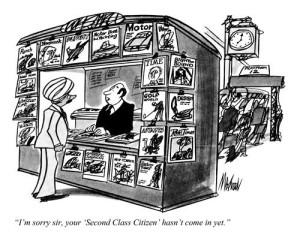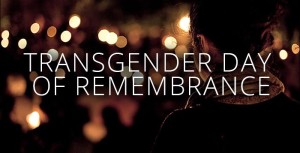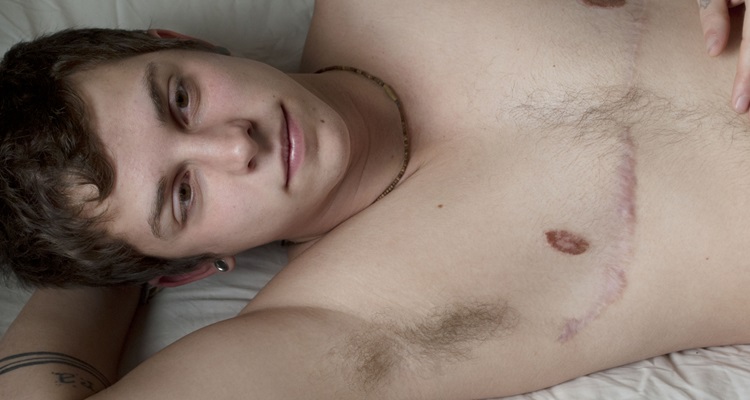Have you ever found yourself in the situation where other people, who don‘t know anything about you, are discussing whether or not you should be granted the same basic rights as anyone else?
If you have, you probably belong to a minority in one way or another.
This whole concept is wrong, in so many ways. First off, why should anyone have to live with a stripped downed version of human rights? It automatically means that people are divided into different classes, depending on their individual worth as a human being.

This is not a new idea. All over the world, people have been demoted from respected human beings, to second (or lower) class citizens, based on their origins, believes and so on. And this has been happening for centuries. Probably all the way since the first pre-human spotted that the tribe in the next valley had different colored eyes.
So debating human rights for minorities is, in that sence, only a slippery slope away from ethnic cleansing. I do not choose these words lightly, nor do I assume that everyone taking part in such a debate has bad intentions.
Quite the opposite. I believe most of them feel their opinions are basis for a successful, well structured society. It‘s just that there will never be a problem so small or so big that limitations to human rights will solve it.
Another problem with such a debate is that there are generally two opposing sides, and one has to be against. Even though they have no real stake, or even understanding of the matter at hand.
But hey, as long as their intentions are for the greater good, right?
Example #1:

Jim Buchy is an Ohio State representative who was advocating extreme anti-abortion legislation for his state. In an interview in 2012, for the Al Jazeera documentary The Abortion War, he was asked the most simple question by a reporter:
What do you think makes a woman want to have an abortion?
Buchy was speechless. This was a totally new idea to him. In a nutshell, his answer (after wrestling with his tounge for a while) was: „I don‘t know. I‘m not a woman. I‘ve never thought about it.“
See for yourself, by clicking here.
Last January (!), a law was passed in Iceland that protects transgender people against many kinds of discrimination and oppression.
Of the 63 members of parliament, 53 voted „yes“, 7 were absent and 3 were present but did not vote. Why? Because they felt the law violated freedom of speech.
They might have had a point, under different circumstances. Because when I say „a law was passed“, I should actually say: „Current laws were changed. In addition to it being illegal to mock, slander, belittle or threaten an individual og group of people with any means of expression, such as with images or symbols, because of nationality, skin color, race, religion or sexual orientation … it is now also illegal to do all of the above to an individual or group of people because of their gender identity.“
So yeah. Not exactly breaking new ground, but rather adding a much-needed criteria.
I do not assume the three MP‘s i n question (I‘ve worked with one of them in the past, and another is dating a friend of mine … welcome to Iceland) meant to object the idea of transgender rights. My understanding is they were trying to seize the moment to point out that they felt the maximum penalty for such a crime (2 years in prison) is so strong that it may undermine a basic human right – the freedom of speech.
n question (I‘ve worked with one of them in the past, and another is dating a friend of mine … welcome to Iceland) meant to object the idea of transgender rights. My understanding is they were trying to seize the moment to point out that they felt the maximum penalty for such a crime (2 years in prison) is so strong that it may undermine a basic human right – the freedom of speech.
The 2 year penalty was originally put in 1973, when Iceland ratified the UN‘s Declaration on the Elimination of All Forms of Racial Discrimination from 1963.
In addition, the other Nordic countries (our friends, our kin, our role-models) have more or less similar penalties.
Why all these boring explanations? Because I strongly oppose to the idea that people with no personal stake can object to a vital human rights law amendment in such a way, in order to serve another cause. However good it may be.
But hey, as long as their intentions are for the greater good, right?
Example #2:

On stage at Dublin‘s Abbey Theatre, Irish drag queen Panti Bliss (don‘t you just love drag-names?) gave one of the most powerful speeches I‘ve ever heard on the different forms of oppression, how non-oppressed (and oppressing) people struggle with understanding the concept of oppression, the idiocy of random people trying to debate the life and rights of minorities they have nothing to do with, how society can make you self-oppress, and finally – my favorite – how the concept of hate speech has been turned on it‘s head, so that Bliss herself has been accused of hate speech for complaining about homophobia.
„And for the last three weeks I have been denounced from the floor of parliament to newspaper columns to the seething morass of internet commentary for “hate speech” because I dared to use the word “homophobia”. And a jumped-up queer like me should know that the word “homophobia” is no longer available to gay people. Which is a spectacular and neat Orwellian trick because now it turns out that gay people are not the victims of homophobia – homophobes are,“ Bliss says in her excellent speech.
See for yourself, by clicking here.
I feel I must add, to all of this, that a lot of progress has been made in gaining basic human rights for queer people in Iceland. The milestone I relate the most to is when, in 2012, a law was passed that grants transpeople the right to medical care, and the children of trans-people the same legal stand in relations to their parent after their parent‘s treatment, as before.
There is still more to be done, though.
Even though no law prevents it, Icelandic officials will not allow you to leave the gender-segment of your passport blank. There are, however, laws that prevent you to choose a non-gender specific first name. Instead, „boys should be given men‘s names and girls should be given women‘s names“.
Both these issues torment transpeople in the early stages of their transition, because for two years, or more, they have to live under one name, but be recognized by „the system“ under another. How often do you use your credit-card, for example? How much trouble can you imagine it would create if it had a name that belongs to the opposite sex?
The one that really bothers me is when in 2011, the kind-of-legally-elected Constitutional Council handed over their proposal for a new constitution, their human rights-chapter was wanting in so many ways. For example, the council composed a list of reasons people could not use as basis for discrimination. Even though the list is somewhat long (15 items including age, sex, sexual orientation, race, opinions, language, religion and so on) there is no mention of gender identity.

You might not think this is a big issue, but since transpeople are far more likely to be victimized by hate crime than most or any other groups of people, it‘s kind of strange. Specially when you learn that gender identity was voted out of the list in a council „show of hands“ by one vote.
And even stranger when you learn the explanation the council gave the „lobbying“ group advocating for a change to get gender identity back in. „It hasn‘t got the same general awareness as homosexuality, so we didn‘t think it should be in the constitution now.“
I could write an even longer article about this council, and the proposal (they call it a bill) they handed over. But I won‘t.
So, I‘m thankful for every small progress but at the same time, I don‘t understand why all of these issues have to go around and around before they are solved. Why it‘s just not enough to see what it takes to give everyone the same basic rights, and just fix it.
We all know there are people who feel that giving other groups of people the same rights they have, makes their rights worth less. And not only that, it makes the other group „privileged“ beyond themselves. (No matter how I try, I can‘t get the math to work on that one.)
The problem with minorities is that they‘ll never get the majority vote. So if you apply the rules of democracy to deciding their rights, they‘ll never graduate from being second class.
And even though most people taking part in the decisions of minorities´ rights are well-meaning, the loud voices of those who fear equality are the ones making the debate necessary.
But hey, as long as their intentions are for the greater good, right?
Although … WHO‘S greater good?

Main Photo: Many teenagers who identify as transgender have appeared to be at higher risk for depression and suicide. But with support from family, friends and society more and more are becoming comfortable with who they are, like activist, artist, writer and musician Skylar Kergil who began documenting his F.T.M. (female to male) transition on YouTube in 2009. Photo by Julia Luckett.


